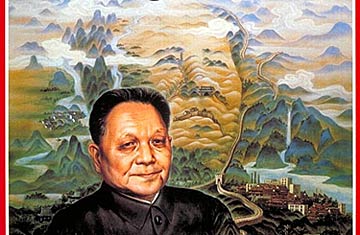
(11 of 20)
A quick six-day tour of the province, for an oldtimer, is a delight. The small towns throb again, their booths full of sweets, cookies, housewares, clothes, textiles, flower pots and flowers. In big cities like Chengdu and Chongqing, the huge food markets overwhelm the eye with food that can be bought without coupons. Hogs come squealing to market in wheelbarrows, on tractors, even lashed to the backs of bicycles, then reappear in the markets as huge slabs of pink-and-white pork. Peasants bring in their wives' squawking chickens, eight to a basket. Down the market lanes peasants sell geese and ducks; eels from the canal ditches; fish from their ponds; fruit; fresh vegetables; herbs, spices, ginger root; delicacies. Canaries are for sale again, along with other caged birds, and cricket boxes. Shoemakers ply their trade; itinerant dentists, with their foot-paddle drills, have reappeared.
The markets are real. So is the astonishing good health, the ruddy vitality of the people, so different from the scrawny peasants I remember 40 years ago. The gurgling babies pleasure the eye — no trachoma, no scabies, no rickety limbs, no potbellies of famine.
But the eye can deceive. This has been a great year in China: a prospective record harvest, record incomes. Yet peasant prosperity is fragile. Here was Sichuan in green spring, the wheat turning yellow, soon to be golden. But if the rains fell at the wrong time, the wheat would be beaten to the ground and lost, and there would be a slim rice crop in the fall. This huge province lives on the margin of hunger.
The "responsibility system" in Sichuan has demonstrated that peasants work best when they tend their own fields. For Westerners this recognition seems equivalent to the rediscovery of the wheel. But with a crucial difference. The state, via the commune, has replaced the old landlord. It owns the fields; the peasant rents an allotted share of land; if he meets the state's quota (once called the landlord's rent), he keeps the rest. This is progress. It is harsh; yet the Great Cultural Revolution was far more cruel.
Days later I visited "a big brigade" in the province of Hubei that was beginning to refer to itself, not as a brigade but, again, as a cun, a village. The brigade chief, a bald-headed veteran Communist, explained once more that peasants could now decide on their own crops and routines. "Responsibility" made them care about the harvest. Then, as an afterthought, he added, "It is not only the attention of the farmer that helps. He now uses his own organic material, also the organic material of the chickens and buffaloes to enrich his fields." I read very precisely what he meant. Now that a peasant is responsible for the land allotted to him, he cultivates it like a garden. His excrement, pig excrement, chicken droppings are all sumped together with urine, then ladled into buckets. The peasant then pours the mixture onto each stalk. Ladling the slime onto the seedlings is smelly, unpleasant duty. But the slime works; production had been rising for three years, and the peasants ate well.
Finally we came to the population problem. Since collectivization in 1958, the brigade's population had risen from 1,300 people to 2,720. So in the reform share-out of 1980, the largest plot was four mu
